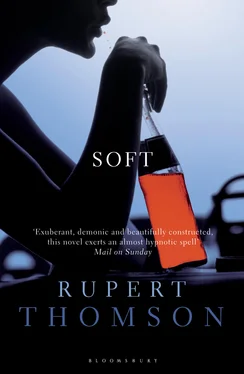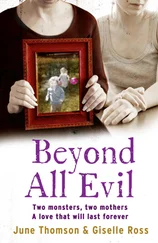An empty feeling, lying there. He couldn’t imagine the future, what it held in store. He felt it was rushing towards him and yet, no matter how hard he looked, he couldn’t see it coming. Once, when he was about fifteen, he and his brother Jim stole a Ford Capri and drove it along the main road at night with all the lights switched off. Nothing happened. They weren’t even caught. He had the same feeling now, somehow, only the excitement had drained away, the daring too, and panic flickered in its place. He imagined lightning striking inside his brain. He could smell scorched air. He thought of Ray and his Tai Chi. In the days when Barker worked on the door of a night-club, there wasn’t much that could surprise him. He was almost always two or three seconds ahead of any move that might be made. But he didn’t seem to have access to that ability at other times. More and more often he felt hurried, unprepared. He knew he couldn’t stay with Charlton for ever, yet there were days when he couldn’t even leave his bed. He had about eight hundred pounds, in cash. That wouldn’t last long, not in London. He needed to find some work — any work. He was reminded of something his father used to say. Jobs don’t come looking for you. Only the police do that .
One afternoon while Charlton was asleep Barker walked to Petticoat Lane. Rotten fruit clogged the gutters, and the sickly scent of joss-sticks floated in the air. He had the sense that, all around him, people were attempting the impossible: a thin man with a twitchy, unshaven face wedging a steel roll-door open with a piece of wood, a pregnant woman selling second-hand TVs. As he stood uncertainly among the stalls, the sky darkened and rain began to fall. He turned a corner, hoping to find shelter — a café, perhaps. Instead he saw an old-fashioned barber’s shop. The sign in the window said GENT’S HAIRSTYLIST and underneath, in smaller, less formal letters, Come In Please — We’re Open . Barker opened the door, which jangled tinnily, and stepped inside. A row of mirrors glimmered on the wall, reflecting the rain that was streaming down the shop-front window; the glass seemed to be alive, liquid. At the back an old man in a white cotton coat was sweeping hair into a pile. Barker asked him if he ran the place. The old man said he did.
‘I’m looking for work,’ Barker said quietly.
The old man looked up from his pile of hair. ‘How m-much experience you got?’
He had a speech impediment — not a stutter exactly, more a kind of hesitation as he attempted certain sounds. He would say the first letter twice and, while he was trying to make it join the rest of the word, his eyes would flutter rapidly. Then he would carry on as if nothing had happened. Barker found he couldn’t lie.
‘I was in the Merchant Navy for a while,’ he said. ‘That was in the late sixties, early seventies. After that I worked for the council as a gardener. I worked in a garage too. Mechanic. The last few years I’ve been a night manager. Well, they call it that. It’s a bouncer, really. Down on the south coast. Plymouth.’
The old man studied him, still gripping the broom-handle in both hands, lips twisting sceptically to one side of his face. ‘Doesn’t sound like you’ve cut a w-whole lot of hair.’
‘Not a whole lot,’ Barker admitted, ‘but I’ve done it.’
His father, Frank Dodds, had been a barber. The sight of that slowly spiralling red-white-and-blue pole had been one of the mysteries of Barker’s childhood. Where did the ribbons of colour come from? Where did they go? Why didn’t they ever run out? He had learned to cut hair when he was thirteen or fourteen — crew-cuts and DAs, mostly. His clients had flat noses and glossy knuckles, and their tattoos had faded to the dirty bluish-grey of veins. Sometimes they would be drunk. Other times his father had to break up fights. In those days it was more like being a bartender than anything else.
‘Tell you what,’ the old man said. ‘I’ll give you a two-week trial. If I still like you after that, you can stay on.’
‘Sounds fair.’
‘The money’s not m-much good.’
‘You really know how to sell a job,’ Barker said, ‘don’t you.’
The old man chuckled, then held his shoulder, wincing. ‘Arthritis,’ he explained. He told Barker what the hours were and what he could afford to pay. ‘Are you still interested?’
When Barker walked back into the house on the Isle of Dogs that afternoon, Charlton was standing in the kitchen, his face still swollen with sleep. Smoke loitered in a cloud above the grill. Charlton had just burned the toast. Now he was trying again. Barker leaned against the fridge and watched.
‘You seen the Nutella?’ Charlton said.
‘No,’ Barker said, ‘I haven’t.’
‘What about the jam?’
‘You finished it.’ Barker reached for the bottle of whisky. He poured a double measure into a cup and swallowed it. ‘I got a job.’
‘About fucking time.’ Charlton bit into a slice of buttered toast. Crumbs tumbled down the front of his black silk dressing-gown.
‘You’re a slob,’ Barker said, ‘you know that?’
Charlton was chewing noisily, mouth open, toast revolving on his tongue. He reached for the paper; he was always reading the financial section and quoting from it afterwards, using words like merger and foreclose .
Barker shook his head. ‘Who’s going to clean up when I’m gone?’
By late September Barker’s life had taken on a whole new shape. Six days a week he worked in the barber’s shop just off Petticoat Lane. The old man’s name was Harold Higgs, and he ran the place along traditional lines — the smell of Brylcreem and hair tonic, copies of the Radio Times to read while you were waiting; it was hairdressing the way it used to be, which suited Barker perfectly. He’d found temporary lodgings — a bedsit on Commercial Road. He had a miniature gas-ring, and a wash-basin with no hot tap (if he wanted to shave, he had to boil water in a saucepan). He had a wardrobe filled with multi-coloured hangers. All mod cons, as his landlady put it. A widow in her fifties, she wore slippers trimmed with bright-pink fur that looked like candy-floss. Whenever she saw him, she talked about her microwave — she was frightened it might give her cancer — but she didn’t bother him, not unless he fell behind with the rent.
Almost two months passed with no violence, no arrests. He was living on a small scale, within himself, his routine simple and unvarying. On weekday nights, when he returned from work, he lifted weights for half an hour. Afterwards, he showered in the communal bathroom, which was on the landing, one floor up. Later, he would cook himself a meal — something sealed in plastic, beans out of a tin. Most evenings he went to look at flats which he had circled in the paper during the day; he was always surprised by how run-down they were, and how expensive. By midnight he would be in his room again, easing the ring back on a can of beer. Through his window he could see a petrol station. The neon stained his white net curtains yellow, and, now and then, if it was quiet, he could hear a fierce, abbreviated hiss as somebody put air into their tyres. Before he switched the light off, he would read a few pages of medieval history — either a textbook or, more frequently these days, an original source like Bede or Fredegar or Paul the Deacon. He had stopped dreaming, which he interpreted as a sign of health.
Then, one evening in November, Charlton took him to a night-club in Mile End, and he was reminded of everything in his life that he had chosen to leave behind. At a quarter to eleven on a Friday Charlton called round in the Sierra, windswept aerial, no hubcaps, and they drove east with Billy Joel on the stereo. Charlton was wearing a new jacket that glinted every time a light passed over it. ‘I feel lucky tonight,’ he said, and patted his breast pocket, which was where he kept his fruit-flavoured condoms.
Читать дальше












